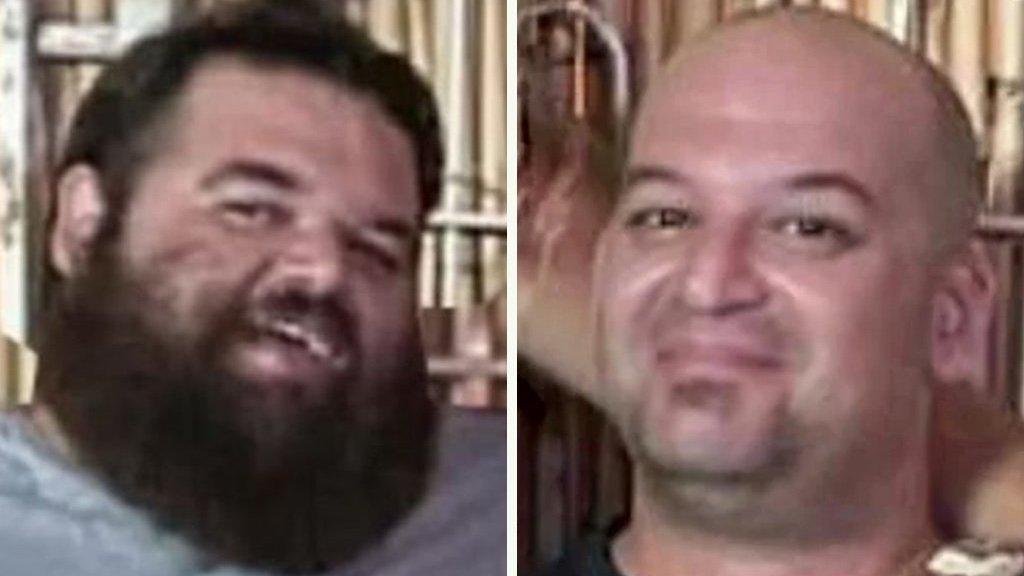Jabalia: Israel air strike reportedly kills dozens at Gaza refugee camp
- Published
Explosion at Gaza refugee camp leaves massive crater
An Israeli air strike is reported to have killed dozens of people at Jabalia refugee camp in northern Gaza.
Gaza's Hamas-run health ministry said 50 people were killed and 150 wounded. But a nearby hospital said it received 400 casualties, including 120 dead.
Pictures showed several large craters, surrounded by shattered buildings.
The Israeli military said the strike killed a senior Hamas commander and "underground terror infrastructure" beneath buildings collapsed afterwards.
It added that a "large number of terrorists" from Hamas's Central Jabalia Battalion who had been with the commander at the time were also killed.
Israeli tanks and troops, meanwhile, continued to advance towards some of northern Gaza's most populated areas, including Jabalia.
Israel has said it is the "second phase" of its war to eliminate Hamas, which began after an unprecedented cross-border attack by gunmen from Gaza on 7 October in which 1,400 people were killed and another 240 taken hostage.
Gaza's health ministry says more than 8,500 people have been killed in the territory since then, while supplies of food, water, fuel and medicine for its 2.2 million residents are dangerously low because of a siege imposed by Israel.
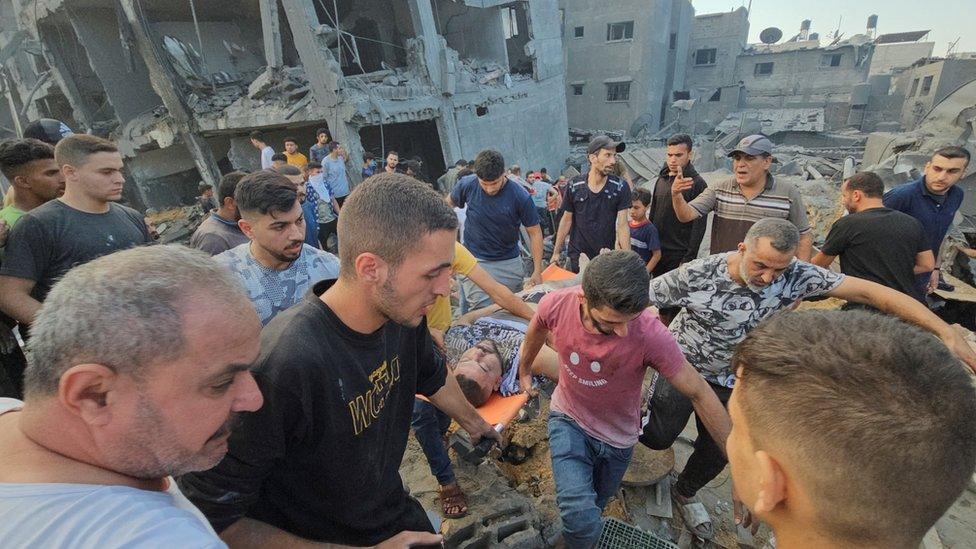
Hundreds of people were seen searching the wreckage for the dead and injured
Tuesday's air strike in Jabalia caused a huge explosion that destroyed several residential buildings in the centre of the refugee camp, where before the war 116,000 people were living in an area of just 1.4 sq km (0.5 sq miles).
Jabalia resident Ragheb Aqal said it had felt like there was "an earthquake".
"I went and saw the destruction... homes buried under the rubble and body parts and martyrs and wounded in huge numbers," he told AFP news agency.
Video footage and photos showed hundreds of people searching the wreckage afterwards. "We're filling bags with children," cried one man, holding up a small white cloth bag covered in blood.
AFP reported that its video footage from the scene showed at least 47 bodies being pulled from the rubble.
A long line of body bags were laid outside the Indonesian Hospital, in nearby Beit Lahia. Its surgical director told the BBC's International editor Jeremy Bowen that it received 400 casualties, including 120 dead, and that the majority were children and women.
Dr Mohamed el-Ron also said there were severely wounded people needing complex surgery who had to be transferred "under fire" to Al-Shifa Hospital in Gaza City.
Médecins Sans Frontières quoted one of its nurses at Al-Shifa, Mohammed Hawajreh, as saying: "Young children arrived at the hospital with deep wounds and severe burns. They came without their families. Many were screaming and asking for their parents."
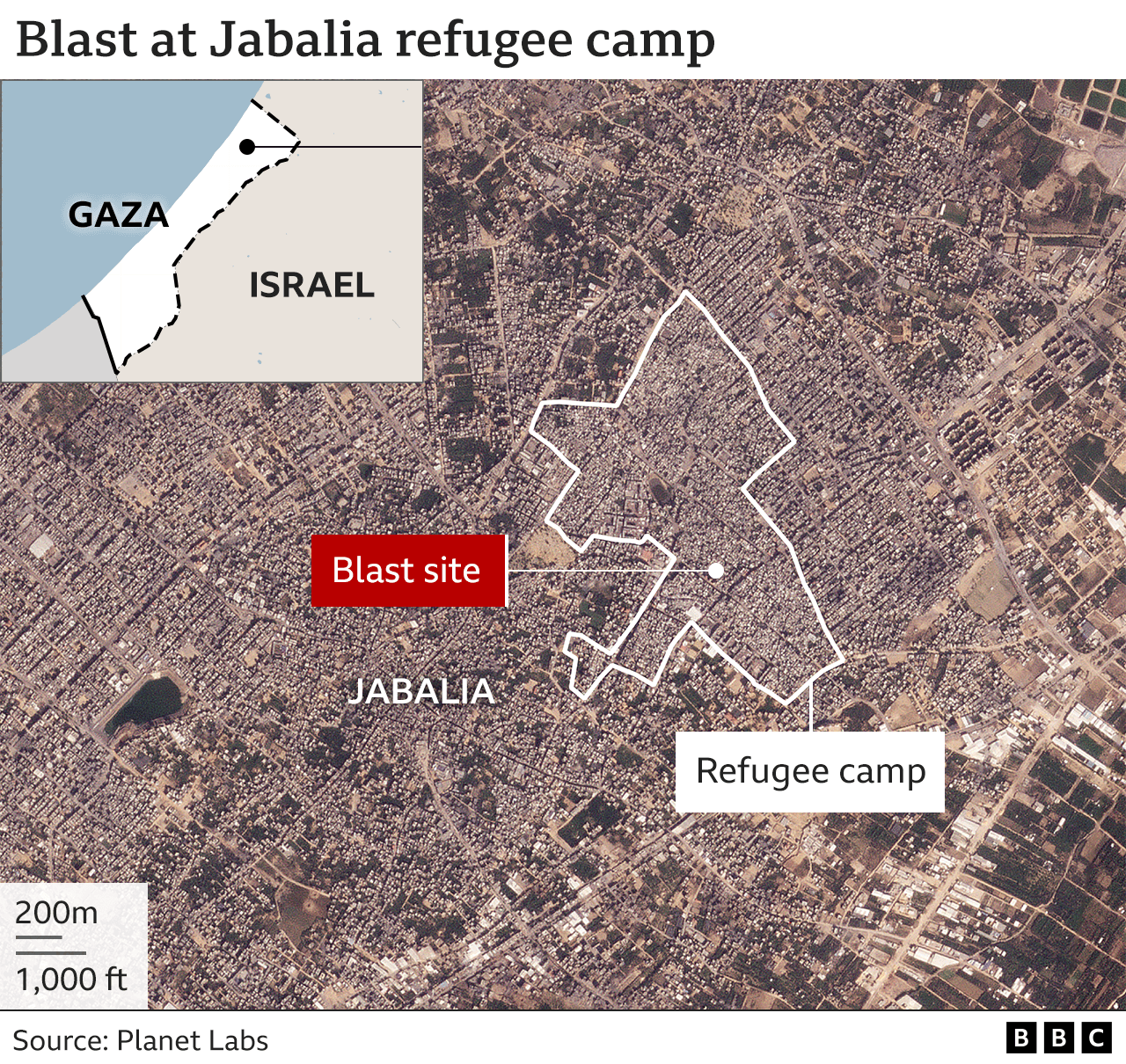
Later, the Israel Defense Forces (IDF) said it had a carried out a "wide-scale strike on terrorists and terror infrastructure belonging to the Central Jabaliya Battalion" and killed its commander, Ibrahim Biari.
"The strike damaged Hamas's command and control in the area, as well as its ability to direct military activity against IDF soldiers operating throughout the Gaza Strip," it added.
"A large number of terrorists who were with Biari were killed. Underground terror infrastructure embedded beneath the buildings, used by the terrorists, also collapsed after the strike."
IDF spokesman Rear Adm Daniel Hagari did not directly address the reported civilian casualties at a briefing, but he said: "The Hamas terrorists continue to use civilian population as protective armour. This is intentional and devastatingly barbaric."
A Hamas spokesman was quoted by Al Arabiya TV as denying that a commander had been in Jabalia, accusing the IDF of "false and unfounded talk" intended to "justify its heinous crime".
The IDF also said that its ground forces had killed about 50 Hamas fighters during an operation to secure a military stronghold in western Jabalia that served as a training centre for the 7 October attack and contained tunnels used as a passageway to the Mediterranean coast.
Two Israeli soldiers were killed during the battle, according to Adm Hagari.
Hamas's military wing said its fighters had hit four Israeli military vehicles within southern Gaza, fired at tanks and bulldozers in north-west Gaza, and ambushed an Israeli unit in the north-east.
Hamas and other Palestinian groups also continued to fire rockets into Israel. Four people in the coastal city of Ashdod were wounded in two attacks.
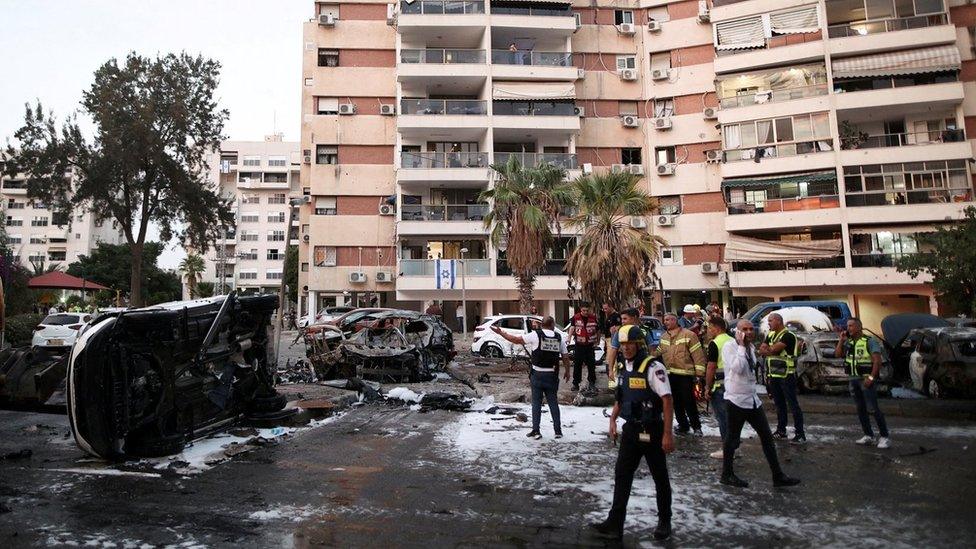
Four people in the Israeli coastal city of Ashdod were wounded by Palestinian rocket fire
Following Tuesday's strike in Jabalia, Adm Hagari once again called on all civilians in the camp and elsewhere in northern Gaza to move to areas south of the Wadi Gaza river for their own safety.
Hundreds of thousands of people have not heeded the order, which the IDF first issued on 13 October.
The UN says about 117,000 displaced civilians are staying in 13 hospitals across the north, along with thousands of patients and medical staff. Many others are sheltering in UN facilities, schools and other public buildings.
On Tuesday, the World Health Organization said it was extremely concerned by reports of air strikes in the vicinity of the Turkish-Palestinian Friendship Hospital over the last two days. The hospital, which is located south of Gaza City, is the main cancer centre in the Gaza Strip.
The BBC verified a video circulated on social media on Monday in which smoke can be seen outside the hospital and an explosion can be heard.
The Israeli military told the BBC that it had not stuck the hospital, but it did not deny that there may have been strikes in the area.

More on Israel-Gaza war
Follow live: Latest updates
Interview: Israel president says military trying to avoid civilian deaths
Reporting on Gaza: 'Sometimes from behind the camera I just stand and cry'
Explained: What is happening in Israel and Gaza, and why now?

Dr Richard Brennan, the WHO's regional emergency director, also warned that the wider health situation in Gaza was "essentially catastrophic", with 8,525 deaths from trauma reported by the health ministry, over a third of hospitals not functioning, and the rest overwhelmed by patients.
"Anaesthetics and painkillers are running short, so doctors are doing procedures without the right medicine and equipment, and patients are suffering incredible because of that," he told the BBC.
Dr Brennan also said the UN had already started to see infectious diseases such as diarrhoea and respiratory infections among the 1.4 million displaced people living in overcrowded and unsanitary conditions.
The US said on Monday night that it was confident there would be an increase in humanitarian aid entering southern Gaza via Egypt's Rafah border crossing in the coming days.
In recent days, there has been a small rise in the deliveries of food, water and medicine being allowed in, but UN agencies said the promised 100 lorryloads a day were a fraction of what was needed.
Israel is not permitting deliveries of fuel - crucial to run hospitals and bakeries, and for purifying and pumping water - because it says it could be used by Hamas for military purposes.
The BBC's Rushdi Abualouf said he saw hundreds of people queuing for a small bottle of clean drinking water from a UN tanker outside a hospital in the southern city of Khan Younis on Tuesday.
A father who had to queue for six hours to get five Arabic flatbreads to feed his family told him: "This is not enough."
- Published31 October 2023
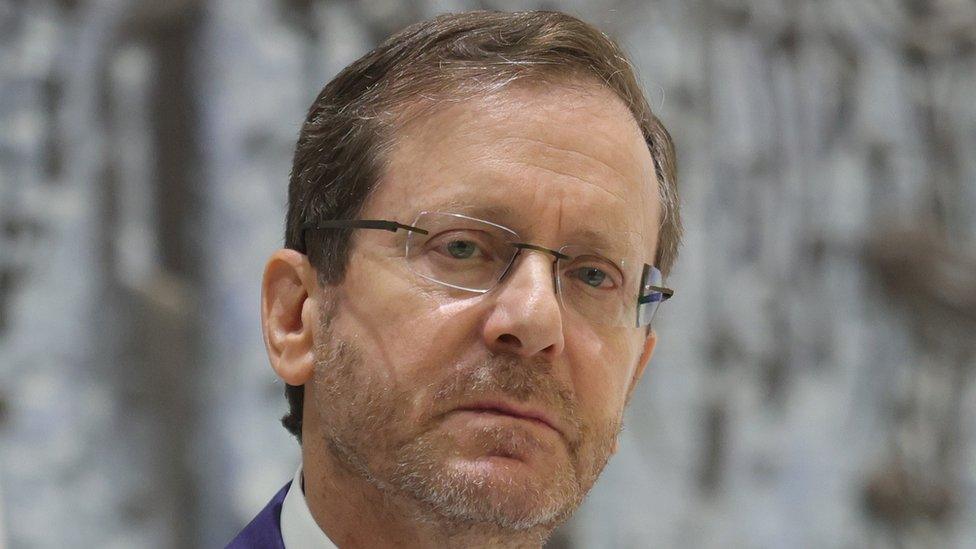
- Published31 October 2023
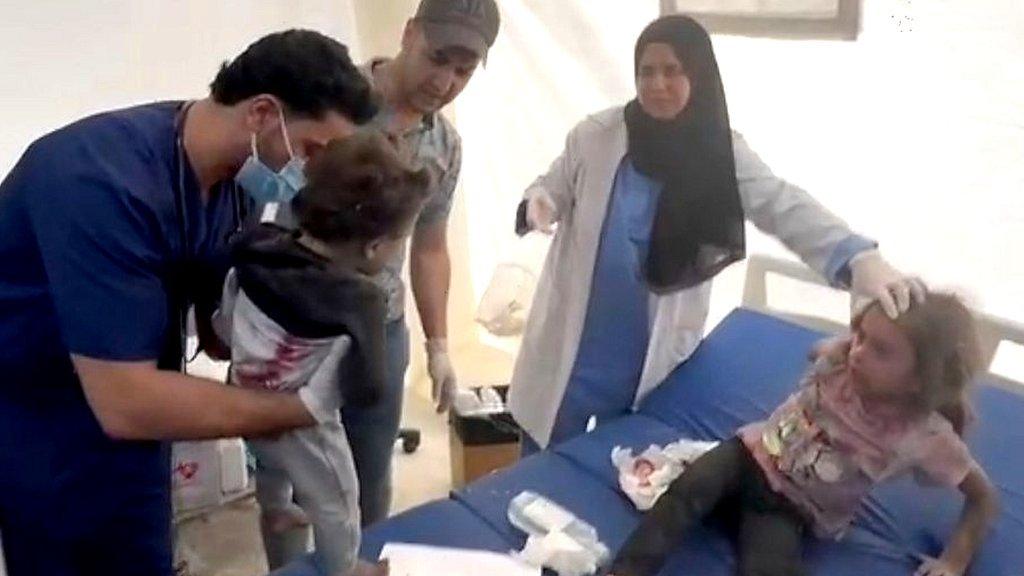
- Published31 October 2023
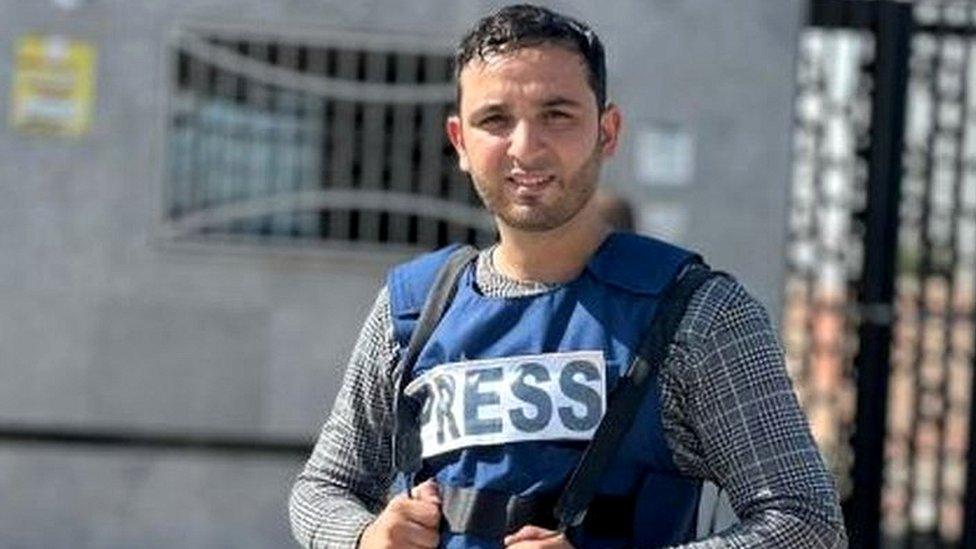
- Published31 October 2023
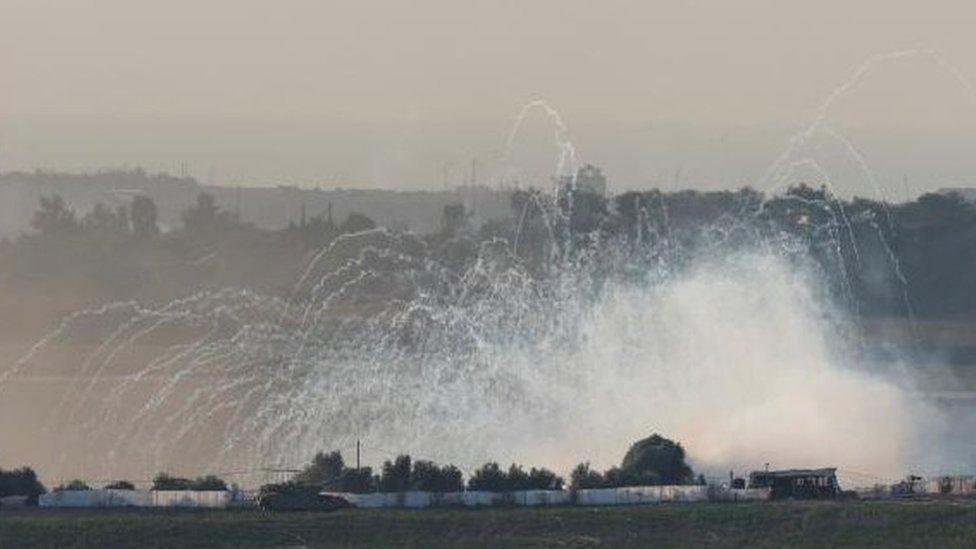
- Published31 October 2023
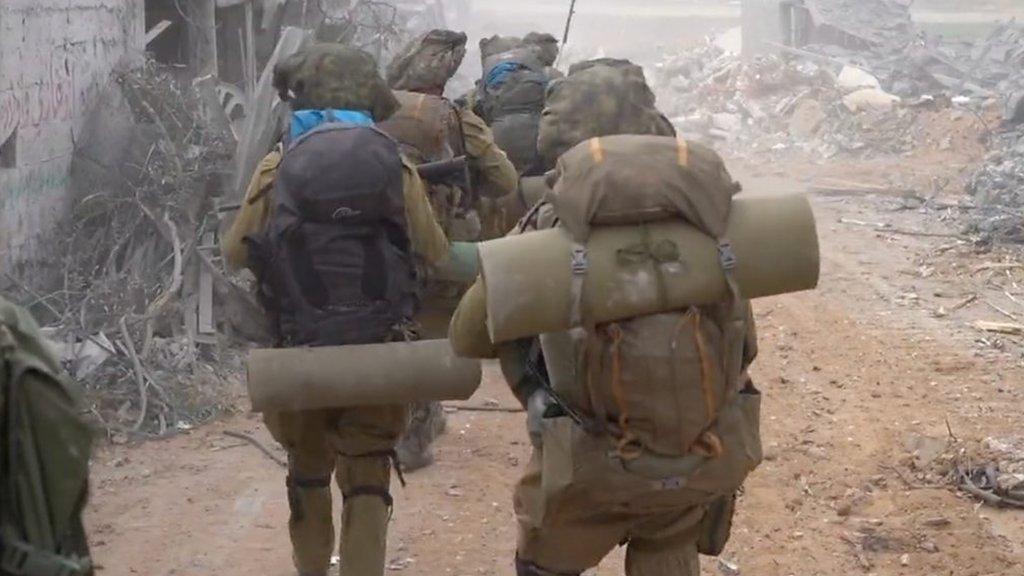
- Published30 October 2023
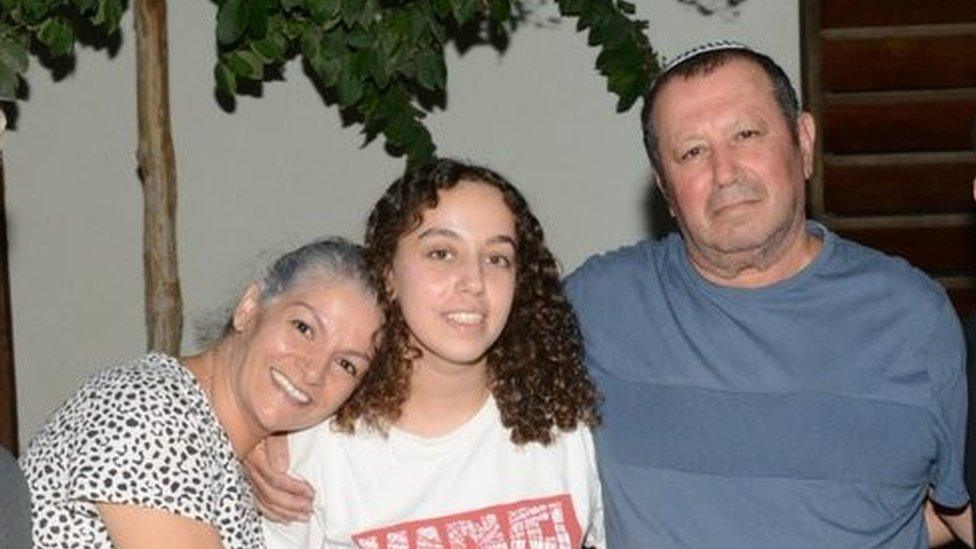
- Published27 February
